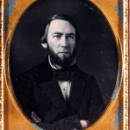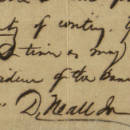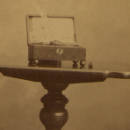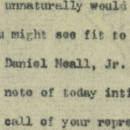
Daniel Neall, Jr.
By Celia Caust-Ellenbogen
Swarthmore College, Class of 2009. Quakers & Slavery Digitization Project Intern
Background
Daniel Neall was born on February 15, 1817, in Bucks County, Pennsylvania. His parents were Daniel Neall, the distinguished dentist, abolitionist, and Quaker; and Sarah Mifflin Neall, daughter of Warner Mifflin and first cousin to Lucretia Mott. In June of 1839, Neall married Cecilia Anderson, the daughter of James and Cecilia Wright Anderson. They had three children together: Eliza, Anna, and Frank, born July 1840, July 1842, and December 1844, respectively. (Justice 19-20.) Neall supported his family by working as a dentist; like his father, he was a rare talent in the field. "One of the very best in his class," a colleague described him in an obituary ("Obituary" 136). He was the first president of the Odontological Society of Pennsylvania; a founding member of the Philadelphia Dental Club; and served on the Board of Trustees of the Pennsylvania College of Dental Surgery (McQuillen 161).
Dentistry was far from the only interest in Neall's life, however. A zealous belletrist, he was loath to let his dental practice interfere with his practice of the finer arts. "Peace to the ashes of the dead pen of communicative thought when the twisted countenance of a grumbling odontalgic patient appears!" he wrote to a friend in 1838. Neall's writings are always a pleasure to read: infused with humor and sympathy, and embellished by excerpted poems and playful diction. At one point he even edited a manuscript literary periodical with some friends, The Erodelphian Gazette--"erodelphian," an amalgamation of two Greek stems, means approximately "a society of brothers who love eloquence." There remains at least one extant volume of the gazette, dated 1843-1844, and edited by Daniel Neall Jr. along with William Canby Biddle and Alfred Bunting Justice. All three were newly-married young men from the Philadelphia area, who probably began their association at an unknown school in the 1830s. All three were Hicksite Quakers who came from an antislavery background, but none carried the antislavery torch so far as Neall.
Humanitarian Concerns
Daniel Neall junior was educated by his father from an early age to understand the evils of slavery. Father and son travelled to Harrisburg for a meeting of the Pennsylvania Anti-Slavery Society in 1837, when the latter was just 20. On May 14, 1838, he watched with admiration as his father presided over the opening of the Pennsylvania Hall. "I think we shall, taking all things into consideration, make the people scratch away the cotton from their ears," he hopefully wrote to a friend on the night preceding the dedication. Then, just days later, on May 17, both Nealls watched with equal horror as the freshly-inaugurated Hall was burnt to the ground by a crowd of anti-abolitionists. "Never shall I forget the fiendish shouts of Exultation," the younger Neall wrote. But for all his youth, he was astute in perceiving the backlash that the mob had unwittingly provoked. "The slave has now friends in this City where ears were deaf to the Truth," he wrote to a friend on May 21; "the fearful encroachments of Wednesday and Thursday nights told them their own liberties were their price to be paid for the Crime of their silence". The days of American slavery were numbered indeed, but the work of the abolitionists was far from complete. During the years of legal and financial struggles that followed, the steadfast Nealls continued to labor on behalf of the Pennsylvania Hall stockholders. By the time Daniel Neall senior resigned the presidency of the Pennsylvania Hall Association in 1845, his son was already serving the Board of Managers as secretary, and would remain so for the duration of the its existence (Thorpe 165).
Daniel Neall the elder died in 1846, but his son lived to witness the abolition of slavery in America. Having labored up to the end of that great moral struggle, his empathy and humanitarian concern never wavered. Friends remembered that he spent the rest of his life "in the constant relief and alleviation of human suffering, and in the doing of little acts of kindness to brighten the pathway of his fellow travelers" (Clothier 134). As one colleague from the dental profession recalled, "He was ready at all times to aid those needing his assistance or encouragement" (McQuillen 161). Although Daniel Neall senior is more generally renowned, all who knew Daniel Neall junior recognized that his kindness, passion, and talent were equal to his father's. All his eulogizers united in saluting "his many sterling qualities, his unswerving honesty, and the constant exhibition of the highest manhood" ("Obituary" 137).
Daniel Neall junior died in 1894.
References
Clothier, Isaac H. "Daniel Neall." Friends' Intelligencer and Journal 51:9 (3 Mar. 1894), 133-134.
"Daniel Neall, Sr.: Pioneer Dentist, Inventor and Abolitionist" in History of Dental Surgery, vol. 3: Biographies of Pioneer American Dentists and Their Successors, p. 161-166. Editor of vol. 3: Burton Lee Thorpe; series editor, Charles R. Koch. Ft. Wayne, Ind.: National Art Publishing Co., 1910.
Justice, Hilda. Life and Ancestry of Warner Mifflin: Friend--Philanthropist--Patriot. Philadelphia: Ferris & Leach, 1905, 19-20, 38-40.
McQuillen, Daniel Neall. "Obituary. Dr. Daniel Neall." The Dental Cosmos: A Monthly Record of Dental Science 36 (1894), 160-161.
Neall, Daniel, 1817-1894. Daniel Neall Manuscripts, Friends Historical Library of Swarthmore College, SC 086.
"Obituary. Dr. Daniel Neall." The International Dental Journal 15:2 (Feb. 1894), 135-137.



